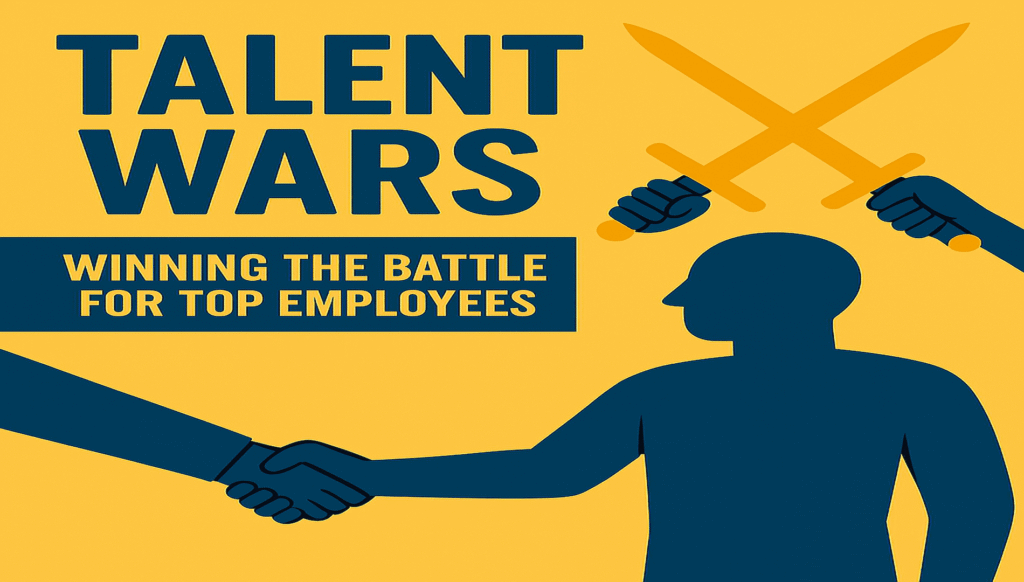
The modern business landscape is fiercely competitive — and not just in terms of products or market share.Equally intense Talent Wars is raging in the realm of human capital: the attraction and retention strategies employed by companies to secure their most valuable asset – their employees.
In my opinion, in this era of rapid technological change and evolving worker expectations, the Talent Wars isn’t merely about offering a paycheck; it’s a multifaceted campaign involving a deep understanding of what truly motivates and engages top performers.
Companies that fail to adapt risk being left behind, their growth stunted by a lack of skilled and dedicated individuals.
Let’s explore the key strategies that forward-thinking organizations are deploying to not only attract but, more importantly, retain the best and brightest in today’s dynamic market.
Talent Wars Strategy 1: Investing in Your People by Improving Talent Progression and Promotion Processes
One of the most powerful magnets for ambitious professionals is the clear promise of growth and advancement within an organization. I believe that companies that actively cultivate their internal talent pool are not just filling future leadership roles; they are sending a strong message that employee contributions are valued and rewarded with opportunities for upward mobility.
As the World Economic Forum’s Future of Jobs Report 2023 points out, improving talent progression and promotion processes is identified by a significant share of organizations as a key business practice to increase talent availability. Isn’t it logical that individuals seeking long-term career success would gravitate towards companies that invest in their employees’ futures?
Consider this: a study by the World Economic Forum in 2024 highlights that improving talent progression and promotion processes is considered a top-three strategy for increasing talent availability across various industries — often outweighing even the lure of higher wages. This suggests a fundamental shift in employee priorities.
While compensation remains important, the opportunity to learn, grow, and take on greater responsibility is a powerful intrinsic motivator. Companies are responding by implementing more transparent promotion pathways, offering mentorship programs, and providing internal mobility opportunities.
In the context of the Talent Wars, organizations increasingly recognize that talent retention is intrinsically linked to career development, and by fostering an environment where employees see a clear trajectory for their professional journey, they are far more likely to stay engaged and committed.
Talent Wars Strategy 2: The Cornerstone of Engagement – Prioritizing Employee Health and Well-being
The traditional view of work often prioritized output above all else — sometimes at the expense of employee well-being. However, the modern Talent Wars demands a more holistic approach.
Companies are increasingly recognizing that a healthy and supported workforce is a more productive and loyal workforce. Supporting employee health and well-being is now a critical talent attraction and retention strategy, as evidenced by its consistent ranking as a top practice for increasing talent availability in the World Economic Forum’s reports.
Think about it: in today’s fast-paced and often stressful work environments, employees are seeking employers who genuinely care about their overall well-being. This goes beyond basic health insurance; it encompasses mental health support, work-life balance initiatives, and a culture that promotes a sustainable pace.
The Future of Jobs Report 2025 even highlights that supporting employee health and well-being is expected to be a top focus for talent attraction, with a significant majority of employers identifying it as a key strategy.
In my opinion, companies that treat their employees as whole individuals, rather than just cogs in a machine, will undoubtedly gain a significant edge in the Talent Wars.
Talent Wars Strategy 3: The Flexible Future – The Rise of Remote and Hybrid Work
The COVID-19 pandemic irrevocably shifted the landscape of work, accelerating the adoption of remote and hybrid models. What was once considered a perk is now, for many, an expectation.
Offering more remote and hybrid work opportunities within countries has emerged as a significant Talent Wars strategy, recognized by a substantial proportion of surveyed organizations in the World Economic Forum’s reports. In some regions, like North America, offering remote and hybrid work opportunities is among the top practices for improving talent availability.
Consider the flexibility and autonomy that remote and hybrid work arrangements provide. Employees can better manage their personal and professional lives, leading to increased job satisfaction and reduced stress.
This flexibility can be particularly attractive to individuals with caregiving responsibilities or those who prefer to avoid long commutes. The Future of Jobs Report 2024 notes that supporting workers with caregiving responsibilities is a growing focus for talent attraction.
By embracing flexible work models, companies can tap into a wider talent pool — a key move in the Talent Wars, especially when traditional office settings limit access to diverse candidates.
Talent Wars Strategy 4: Unleashing Potential by Embracing Diversity and Inclusion Initiatives
In today’s socially conscious world, a commitment to diversity, equity, and inclusion (DEI) is not just a moral imperative — it’s a strategic advantage in the Talent Wars.
Companies that actively cultivate diverse and inclusive workplaces are not only fostering a more equitable society but also attracting and retaining a wider range of perspectives and talents. More DEI policies and programs are increasingly recognized as a valuable talent attraction and retention strategy.
Think about the richness of ideas and innovation that can emerge from a diverse workforce. Individuals from different backgrounds bring unique experiences and perspectives, leading to more creative problem-solving and a better understanding of diverse customer bases.
The Future of Jobs Report 2025 highlights that employers are increasingly focusing on work experience and psychometric testing over traditional credentials like university degrees — signaling a growing recognition that practical skills and cognitive abilities may be more indicative of future job performance.
In my opinion, companies that actively champion DEI are not just building a better workplace; they are fortifying their positions in the ongoing Talent Wars.
Talent Wars Strategy 5: Investing in Tomorrow’s Skills Through Reskilling and Upskilling
In an era of rapid technological advancement, the skills in demand today may not be the same tomorrow. To win the Talent Wars, companies must not only attract individuals with current skills but also invest in the continuous development of their existing workforce. Providing effective reskilling and upskilling opportunities has become a crucial talent attraction and retention strategy.
Consider the pace of change driven by technologies like AI and big data. The World Economic Forum’s reports consistently emphasize the growing importance of skills in these areas. The Future of Jobs Report 2025 notes that analytical thinking and creative thinking remain the most important skills for workers — and that training workers to utilize AI and big data ranks high among company skills-training priorities. In my opinion, companies that offer reskilling and upskilling programs not only address potential skills gaps but also demonstrate their commitment to employee growth and development. That’s how they stay ahead in the Talent Wars.
Furthermore, public policies that support funding and provision of reskilling and upskilling are seen as crucial for boosting talent availability. This highlights the collaborative effort needed between businesses and governments to create a workforce that is adaptable and future-ready.
Here’s What I Think:
While the strategies outlined above — improving talent progression, prioritizing well-being, embracing flexible work, fostering DEI, and investing in reskilling — are undoubtedly crucial for winning the current Talent Wars, I believe that truly groundbreaking success in attracting and retaining top employees requires a more radical reimagining of the employer-employee relationship.
Talent Ecosystem Partnerships.
Firstly, I advise the concept of Talent Ecosystem Partnerships. Instead of solely focusing on internal development, companies should actively partner with external educational institutions, even competitors (in a non-competitive talent-sharing agreement), and gig economy platforms to create a dynamic ecosystem of talent exchange and development.
Purpose-Driven Benefit Portfolios
Secondly, I envision the rise of Purpose-Driven Benefit Portfolios. Companies should empower employees to customize their benefits based on their values and life stages — deepening their emotional investment in the organization.
Decentralized Skill Ownership.
Thirdly, I believe in the potential of Decentralized Skill Ownership. By enabling employees to direct their own growth through “Skill Stipends” and internal learning platforms, companies can foster a self-sustaining culture of innovation and mastery.
Algorithmic Talent Matching for Growth
Finally, I foresee the evolution of Algorithmic Talent Matching for Growth — internal AI platforms proactively connecting people to career opportunities, internal gigs, and mentors, ensuring that talent is never idle and always evolving.
These divergent ideas, focused on ecosystem partnerships, purpose-driven benefits, decentralized learning, and smart internal mobility, in my opinion, represent the next frontier in the Talent Wars. Companies that adopt them will not only win the war today but build an unshakable foundation for tomorrow.
Sources of insights:
World Economic Forum. (2025). The Future of Jobs Report 2025.

Ajay Dhage is a seasoned talent acquisition leader with over 20 years of experience in Talent Acquisition and Workforce Strategy across the oil and gas, EPC, and renewables sectors. As Talent Acquisition Lead for a global Oil & Gas EPC company in India, he manages the end-to-end hiring lifecycle for complex, multi-disciplinary projects, from sourcing and assessment to onboarding and workforce planning. Known for his customer-focused approach and innovative use of AI and data in hiring, Ajay focuses on building future-ready workforces and resilient leadership pipelines. Through ajayable.com, he shares insights, trends, and practical frameworks to help HR professionals, organisations, and recruiters excel in a rapidly evolving, competitive talent landscape.